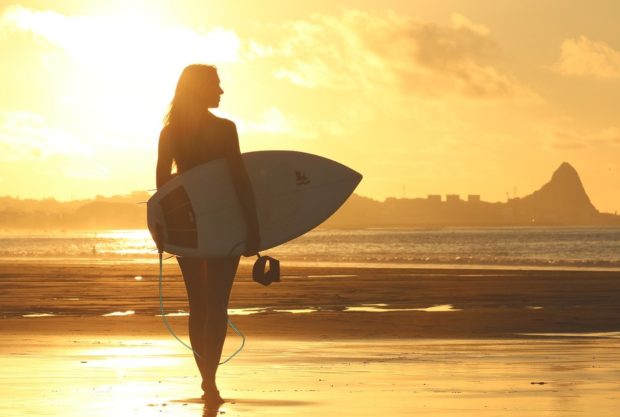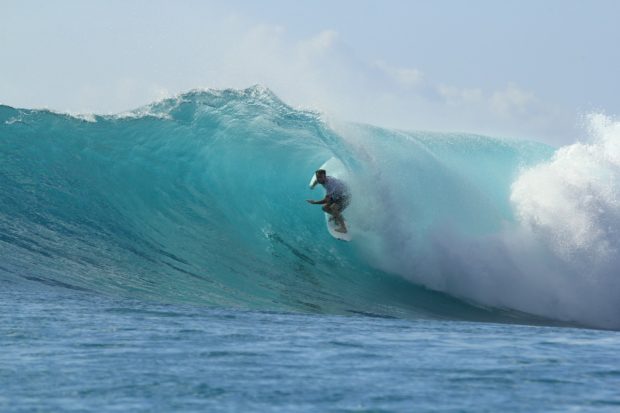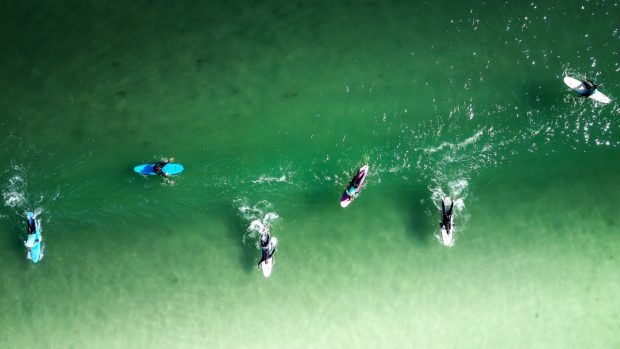If surfing is something you always wanted to attempt but were leery of starting for fear of lack of ability and potential injury, a few tips will help you get started. Remember, while you make your first endeavors, that the initial outcomes do not forecast your future as a surfer. There is a learning curve to surfing. Follow these tips and you will be on your way to surfing solo.
Choose the Right Surfboard
You want to begin with a soft-top longboard when you start out surfing. Maybe you are protesting that you can snowboard like a professional, but that experience does not apply. Balancing on a shortboard will not help you if you cannot catch a wave. Your first 100 sessions need to be on a longboard. Your only means of improving as a surfer is to catch more waves. With a longboard, you start with a solid wave-catching handicap. Longboards get you a greater number of waves, making it easier to catch those waves, and letting you conserve energy as you paddle back out. At first, you will also spend more time sitting on your board. A soft-top is a good entry board. It is safer for all involved. As you learn, you will inevitably get hit by your board. With a soft-top board, your body can withstand the abuse.

Choose the Right Location
The most popular surfing locations are bound to be crowded. As a beginner, you want to avoid the packed beaches and populous waves. Those popular spots are peopled with experienced surfers who will claim the best waves. A location that is less popular permits you to catch more waves. Time on the waves is the primary means of finding improvement at surfing. You will improve at a faster pace than if you struggle for scraps of waves in top surfing spots in your area. Also, remember that the ideal conditions can be found on lesser populated beaches, too. Surfing conditions rely on the wind, which can shift from minute to minute. Experienced surfers looking for light offshore wind or glassy conditions where there is no wind at all. Light offshore winds make waves remain vertical for longer periods, whereas glassy conditions make for smooth, clean rides without turbulence.

Choose the Right Paddling Position
Surfers who are just starting often sit too far back while paddling on their boards. This makes it do a sort of wheelie position and causes slow going. Then, too, some beginners sit too far up atop their boards when paddling. This pokes the nose underwater. You need to locate a sweet spot at the center of your board. When you have found it, mark it with a bit of wax. Always make sure you paddle while sitting in that position.

Follow Proper Paddling Guidelines
First, take on the whitewash straight on, not at an angle or horizontally. Next, find a rhythm and maintain it. Be prepared to become exhausted when you first start. Alternate strokes. Do not allow your shoulders to sink while you stroke. While you are at it, remember to take an extra paddle when the wave begins to lift you. An extra strong paddle at that point gives your velocity a boost. This ensures that you will not be stuck atop the wave.
Choose the Right Teacher
Regardless of how easy surfing looks to you, never approach the sport solo. You need to find an experienced friend or classes such as at a surf school in Santa Barbara that offers to teach you. This way, you avoid causing injury to yourself or others. Starting by yourself can even put your life in peril. If you decide to go the class route, do some research ahead of time. Look into the teacher options. Make sure that they have good reviews and plenty of experience. A good teacher may go beyond simply instructing you in how to surf, providing you with inspiration and a love of surfing.
As with any sport, you need to put effort and time into enhancing your skills with these tips. Surfing is among the most complex of sports. It is a great way to work out, relax, and engage with fun people who share an amazing passion.
